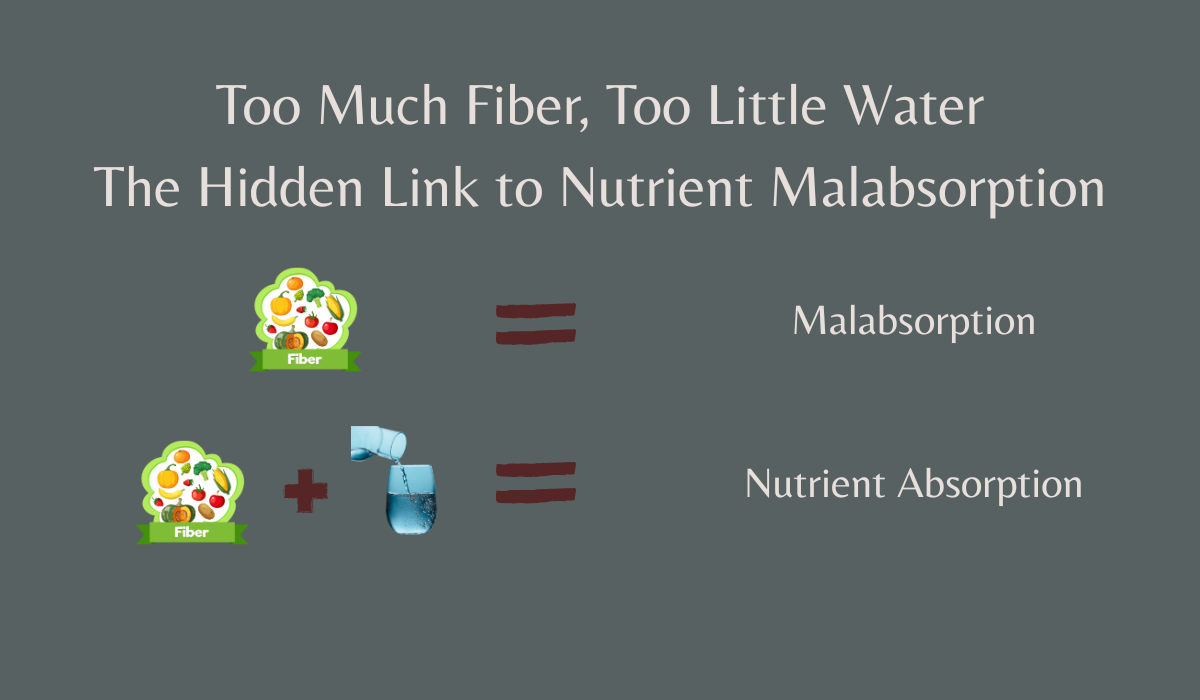When “Eating Healthy” Creates a New Problem
You switched to whole grains.
Added flax seeds to your smoothies.
Began every day with soaked methi or chia.
Started eating salads daily to “cleanse the gut.”
And yet…
You feel bloated, constipated, low on energy, and your labs show low iron, calcium, or vitamin D.
You’re not alone—and you’re not doing anything “wrong.”
You just missed one key piece of the puzzle:
Fiber needs water—and balance—to work. Without that, it can create a digestive traffic jam and block absorption.
What Happens When Fiber Isn’t Supported?
Dry fiber = Dry gut
Fiber, especially the insoluble type (found in bran, wheat, raw vegetables), acts like a sponge.
It pulls water into the colon to create bulk and stimulate movement.
But when hydration is low, it stays dry, dense, and hard to pass.
Result?
-
Sluggish transit = Constipation
-
Fermentation in the gut = Gas and bloating
-
Minerals get bound = Poor absorption of magnesium, iron, calcium, zinc
-
Fatigue & heaviness despite clean eating
Fiber Type Matters
| Type | Examples | Key Consideration |
|---|---|---|
| Soluble | Oats, chia, methi, barley | Soaks water & slows digestion; needs liquid support |
| Insoluble | Wheat bran, raw greens, skins of fruits | Adds bulk but can be harsh on sensitive guts |
| Fermentable (Prebiotic) | Onion, garlic, banana, legumes | Great for gut bacteria, but gas-producing |
| Resistant Starch | Cooked-cooled rice, potato, green banana flour | Supports colon health; needs proper timing |
Practical Fixes: Balance Fiber with Smart Liquids
If you’re increasing fiber, don’t stop there – support your digestion with strategic hydration:
Timing-based Liquid Support
Morning:
-
-
Jeera water or warm lemon water to kick-start motility
-
Coconut water for potassium if fiber increase causes cramps
-
Mid-morning:
- Herbal infusions (saunf, ajwain, cardamom) to reduce bloating
Pre-lunch:
-
-
1 glass plain water, 20 mins before to prep gut for digestion
-
Evening:
-
-
Thin buttermilk with ajwain for enzyme support
-
Bedtime:
-
-
Lukewarm water with ghee or soaked raisins for overnight softening of stools
-
Signs You’re Getting Fiber Imbalance
Watch out for these:
-
Going less than once a day despite high-fiber meals
-
Hard, pellet-like stool
-
Constant bloating after meals
-
Tiredness despite eating clean
-
Cravings even after full meals
-
Low iron, calcium, magnesium or B12 despite supplements
Other Corrective Tips
-
Cook most high-fiber foods – raw isn’t always better for digestion
-
Space fiber – Don’t stack all high-fiber foods in one meal
-
Use ghee/tadka – Helps smooth movement and support bile flow
-
Mind your sodium – Excess fiber without salt balance can increase cramps
-
Don’t just sip water—have mineral-rich liquids
Why This Matters at IntuiWell
Many people who come to us with stubborn constipation or fatigue have already been eating “healthy” by the book.
But they weren’t eating according to what their gut needs.
We’ve seen real turnarounds when we adjust:
- The type of fiber
- When they’re eating it
- What it’s paired with (water, salt, enzymes, fat)
- And how it supports their nutrient absorption—not block it
Because health isn’t about adding random “superfoods.”
It’s about smart combinations, timing, and gut context.
Final Reminder
Just eating more fiber isn’t the fix.
Absorption is the goal. Digestion is the path.
And hydration? That’s the bridge between the two.
This is exactly what we simplify and personalize inside IntuiWell—gut-first strategies for long-term wellbeing.



